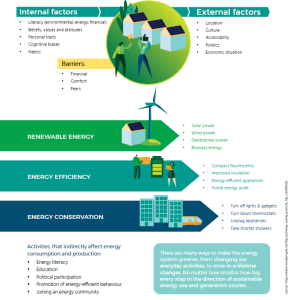4
Mark Andor and Stephan Sommer
The evolution of energy systems and the development of new energy technologies requires individuals and communities to make a variety of energy-related decisions every day, as household members, members of society, and citizens of the world. These decisions, in turn, influence the design of energy systems and affect all areas of life that are directly or indirectly related to energy production or use, such as use of energy at home (heating, cooling, cooking), transportation, public systems (healthcare, education), industry, etc.
As individuals, we make energy-related decisions mainly connected to our personal everyday lives, for example choosing to use a device, or less frequent activities, such as choosing an electricity provider or buying a new refrigerator.
The decisions we make as local communities and societies have a larger and more visible impact, affecting energy demand and supply, but also resulting in new forms of energy production, storage, and consumption, through collective organisation and effort.
Energy-related decisions are also made in political environments. These kinds of decisions encompass regulations, policies, and incentives but also the development of strategies to connect with other countries. In a nutshell, all these decisions have a bearing on energy production and consumption.
Matters are complicated by the fact that all these decisions are intertwined, one affecting and influencing the other, from national and international regulations affecting households and individuals to citizens’ movements and local engagement affecting larger national and international systems. The growth of the bottom-up principle, also including energy communities, is well presented in the adaptation of EU regulations and policies to build a more citizen-led energy system.
Our society and energy dilemmas
As a society, we face several energy-related challenges and dilemmas that have a severe impact on the quality of our lives and existence, our economy, and the environment we live in.
How much effort and resources are we willing to invest into alternative energy sources? Can sufficient energy be distributed fairly, safely, and economically to all parts of the country? The answers to all these questions are dependent on the decisions we make about energy, which are dependent on the local economy, and political environment.
Energy decisions in households and communities
A household’s energy decisions usually concern three main categories that differ in the financial resources they require – energy saving, energy efficiency, and energy production. The first category includes mostly behavior, anything from turning off the lights when leaving a room, cycling instead of driving a car, shortening the lengths of our showers, and lowering the thermostat for a degree or two. The second category comprises activities that minimize our use of energy for achieving specific energy services, like heating our homes, or cooling our food. Examples for efficiency measures in the home are installing better insulation or buying more energy-efficient appliances. Finally, households can invest in their own energy production (e.g., a solar panels for electricity generation or solar heating) to produce energy themselves, either by themselves or by collaborating with others in a community. While these investments initially come with a bigger price tag, once implemented they require much less effort and time investment.
Those citizens and households that, besides consuming energy, also produce energy are called prosumers. Producing energy can either be done individually or in a community setting. While the reasons behind the decision to produce energy vary, many people join forces to produce, store or distribute energy not only for their own benefit but also for the general benefit of the society and environment. These individuals amplify their role in the energy system and are more actively involved in the energy transition through collaboration.
The level and type of a person’s involvement in a more responsible energy behaviour is largely dependent on the environmental, financial, and political circumstances. In addition, there are several external barriers, such as an individual’s lack of financial assets, lack of subsidies or loans to finance clean energy investments in their homes, or lack of access to certain technologies. Further, there are many internal barriers such as our belief systems, attitudes, fears, cognitive biases and habits, that prevent people from making energy-related changes.

